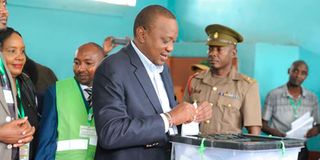Why we should project-audit politicians during and after term

President Uhuru Kenyatta casts his vote in the presidential elections of October 26, 2017 at Mutomo Primary School in Kiambu County.
What you need to know:
- Can our politicians' development record be measured against the huge salaries they draw?
- Sharing of development projects should be easy for one of the countries with the most advanced internet penetration.
As campaigns for the 2022 General Election gain momentum, this is the time to ask ourselves whether Kenyan taxpayers got value for money in the past 10 years.
The ‘Big Four Agenda’ is hard to critique as it has not had enough time to form. But Jubilee Party did gain power on the back of huge promises. One was creation of a digitised country. The mantra was something like “Out with analog, in with digital”. In the same breath, Jubilee promised an excellent education system where every school-going child would get a laptop to prepare them for the new digitised world.
Despite excellent internet penetration across the country, the laptop promise did not materialise and many schools still struggle with basics such as pens and books. It was a far-fetched idea in the first place, given the fact that most schools in rural country were not electrified or equipped with solar power to enable the use of laptops by pupils.
Ten stadiums for every county was another lofty promise that died in the sand.
I’m not questioning these things now to shame Jubilee but rather to question the whole ethos of politicians’ conduct during their term in office. Can their development record be measured against the huge salaries they draw? Were this a final college exam, many of our politicians would fail. Taking a picture with a girl holding a menstrual pad counts not; neither a photo-op with bursary recipients.
Utopian economic model
Development means a different thing to different people. In poor countries such as ours, it draws its meaning from the tangible and positive life impacting institutions and policies. If the manifesto of a given party promised hundreds of schools, then it’s to be expected that those schools would be realised, not just in brick and mortar, but fully kitted and ready for use.
When Kenyans get excited by a new hospital building, my first question is whether there are enough medical personnel, equipment and medicine or was it just set up for kickbacks? That’s why the rush for mega structures have always left doubts in our minds, because we’ve got used to the fact that there’s always the ulterior motive to benefit a few with kickbacks, whether the structures serve any purpose to ordinary citizens or not.
UDA party and its utopian bottom-up economic model on the back of a wheelbarrow (why not drones?) has had me thinking too. For whatever it means, I just see it as the same sugar-coated, unachievable promises that came with Jubilee but are now dressed in different clothes.
Given the level of inequality in the country, the model is bound to create the same problems, where the poor have crumbs (wheelbarrows and short-term cheap ugali) thrown at them and made to work extra hard to narrow the gap between the haves and have-nots. Its proponents are the same lot that sold us a ‘Digital Kenya’ with laptops for every child and stadiums galore. Why should they be believed when they failed to keep to the earlier promises?
Reducing corruption
Politics has become mired in deceit and greed. (Look at Pandora Papers.) This is not just in Kenya but it now seems to be the norm globally. Once politicians fail on their promises, they turn to diplomacy and sound bites on how to improve the socioeconomic status of the citizens to hook them once more. The same politicians who did not actually have money to build your hospital still manage to retire in villas despite living in huts prior to election.
But does politics have to be all about lies and allowances? I think not; hence, why it is important that we now move to another space where we can hold politicians to account if they fail to deliver on their mandate. After all, if a con man duped you for work not done, you would take him to the cleaners; so why not your representatives, whom you pay through the nose?
I did write in these pages some time back to suggest that politicians at any level should be sending quarterly reports to the voters on how much they have achieved in their areas in terms of development. This should now be law. First, it will help in reducing corruption and, secondly, make public and state officials more accountable to the voters. Sharing of development projects should be easy for one of the countries with the most advanced internet penetration. No?
As we register to vote, let us assess whom you vote for. If it is the same lying and thieving lot, then, dear voter, you only have yourself to blame. To cut through all the lies, we need to start project-auditing politicians. As things stand, the huge salaries they get are not commensurate with the poor record of development in many parts of the country. That must change. Now.
Ms Guyo is a legal researcher, [email protected]. @kdiguyo





